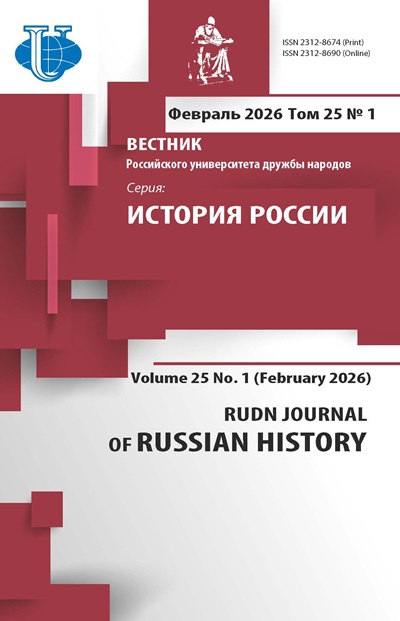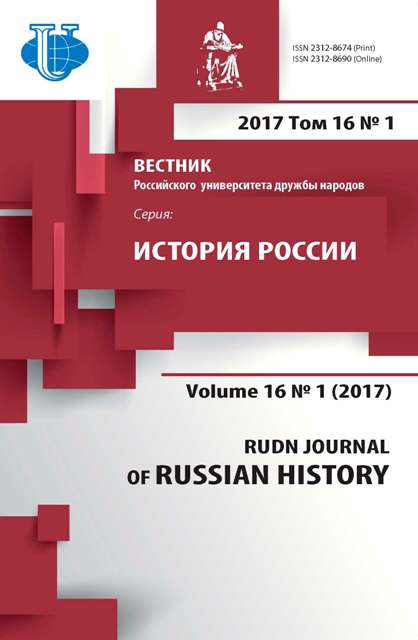THE MUSLIM COMMUNITY OF MOSCOW IN 1917-1930-IES
- Authors: Asadullin F.A1
-
Affiliations:
- The Council of Muftis of Russia
- Issue: Vol 16, No 1 (2017)
- Pages: 20-33
- Section: CONFESSIONAL HISTORY OF THE PEOPLES OF RUSSIA
- URL: https://journals.rudn.ru/russian-history/article/view/15758
- DOI: https://doi.org/10.22363/2312-8674-2017-16-1-20-33
- ID: 15758
Cite item
Full text / tables, figures
Abstract
The article deals with the relationship between the Bolshevik government and the Muslim ummah of the Soviet Russia in the first decades of the Bolshevik period through the example of the Muslim community of Moscow. Besides, there is considered the issue of the level of religiosity among the Muslim population of Moscow in connection with the anti-religious campaigns and the implementation of the program “atheistic five-year plan” in 1932-1937.The author emphasizes two steps in the relations of the state and Islam. The first period, 1917 - the early 1920s, was characterized by the intensification of the spiritual life of the Muslim community and its willingness of cooperation with the Bolshevik government. It was the reaction to the implementation of the Bolshevik slogan of the right of religious freedom. The second period, the early 1920s - 1930s, was associated with conducting anti-religious campaigns, including the ones against Islam. Most mosques were closed. These events were based on the new socialist values. In 1937 all national organizations were recognized wrecking, whereupon most national cultural institutions in Moscow were closed.The author admits that under the influence of thedaily socialist propaganda pressure, the Muslim population of Moscow hid their religious feelings. At the same time, the author points out that the belief in people’s minds still occupied an important place. This conclusion is based on the documents from the Central Municipal Archives of Moscow (TSMAM), as well as the statistics showing a high rate of Muslims in Moscow. The greatest attention of the Soviet Government during the period was paid to the atheistic education of children. In this regardthe atheistic propaganda was asuccess, but it does not mean that many people abandoned their faith. Under the circumstances, people learned to hide their religion. Despite the efforts to fi ght against Islam in schools, the faith of many pupils of the capital, especially of the Tatar nationality, was strong thanks to family education.
Keywords
About the authors
Farid A Asadullin
The Council of Muftis of Russia
Author for correspondence.
Email: a.farid@inbox.ru
7 Vypolzov lane, Moscow, Russia, 129090
References
- Rozenberg LI. Tatary v Moskve XVII −serediny XIX vekov. Etnicheskie gruppy v gorodakh Evropeiskoi chasti SSSR. Moscow; 1987 (in Russian).
- Sadur VG. Tatarskoe naselenie Moskvy (1860−1905). Etnicheskie gruppy v gorodakh Evropeiskoi chaste SSSR. Moscow, 1987 (in Russian).
- Khairetdinov DZ. Musul’manskaya obshchina Moskvy v XIV – nachale ХХ veka. Nizhnii Novgorod, 2002 (in Russian).
- Musul'mane izmenyayushcheisya Rossii. Moscow: ROSSPEN, 2002 (in Russian).
- Gavrilov YuA. Shevchenko AG. Islam i pravoslavno-musul’manskie otnosheniya v Rossii v zerkale istorii i sotsiologii. Moscow: Kul’turnaya revolyutsiya, 2010 (in Russian).
- Shatsillo MK. Musul'mane-predprinimateli Moskvy i Peterburga. Chastnoe predprini-matel’stvo v dorevolyutsionnoi Rossii: etnokonfessional’naya struktura i regional’noe razvitie, XIX – nachalo XX v. Moscow: ROSSPEN, 2010: 292.− 303 (in Russian).
- Goncharova NS. Tatary v Moskve. Opyt istoriko-statisticheskogo issledovaniya [PhD thesis]. Moscow; 2003 (in Russian).
- Barudi G. Pamyatnaya knizhka (Khater daftare). Kazan’: Iman, 2000 (in Russian).
- Azizov F (Editor). Kto est’ kto v tatarskoi obshchine Moskvy. Moscow; 2001 (in Russian).
- Galimov A. Dvoinoi ryvok. Tatarskii mir. 2008; 6 (6293). (in Russian).
- Butaev B, Morozov V. Fatima Butaeva: uistokovsozdaniyalazera. Naukaizhizn’. 2007; 12:8−15 (in Russian).
- Ashirov N. Evolyutsiya islama v SSSR. Moscow; 1973 (in Russian).
- Togan ZV. Vospominaniya. Moscow; 1997 (in Russian).
- Aminov DA. Tatary v St. Peterburge. Istoricheskii ocherk. St-Petersburg, 1994 (in Russian).
- Kuz’min AV. (editor) Moskva na rubezhe XX−XXI vv. Moscow, 2003 (in Russian).
- Oparin D. Rauza Kostrova. Bol’shoi gorod. 9 August 2011; 14 (280). (in Russian).
- Klimovich L. Prazdniki i posty islama. Moscow, 1941 (in Russian).
Supplementary files















